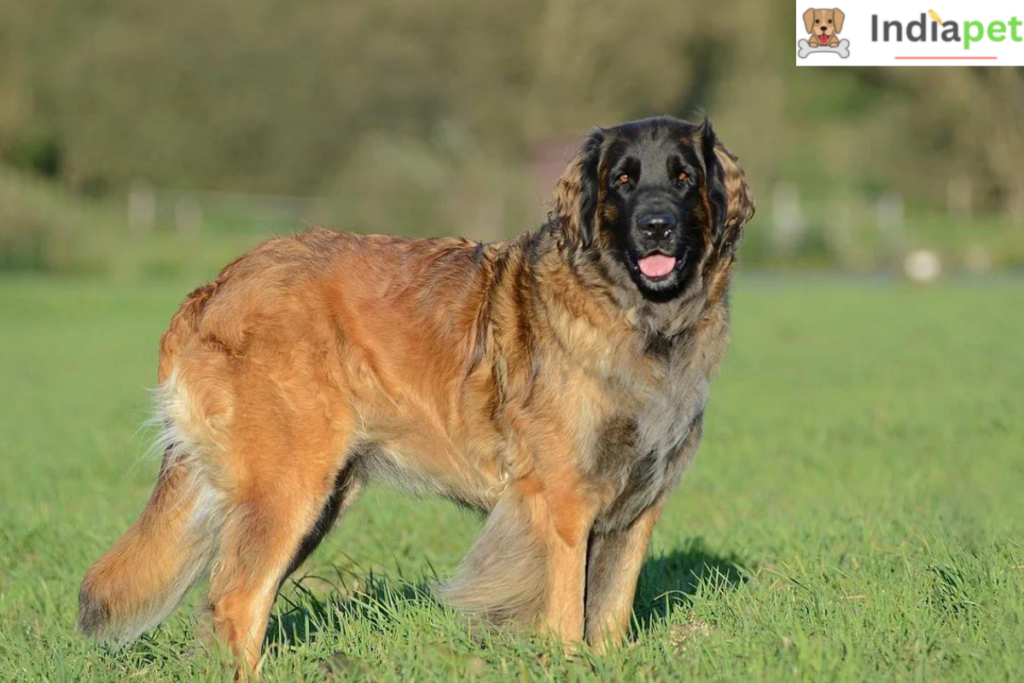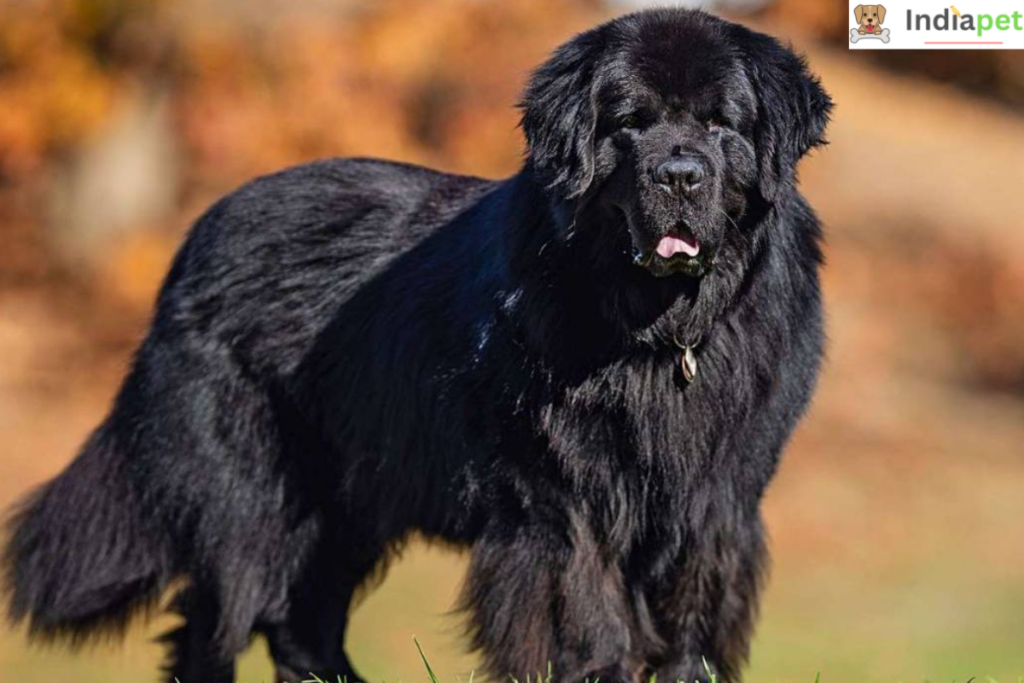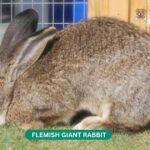Newfoundland vs. Leonberger: A Comprehensive Comparison – When choosing a dog, especially among large breeds like the Newfoundland and Leonberger, it’s essential to understand the differences and similarities. This guide delves into various aspects of these magnificent breeds, helping potential dog owners make an informed decision.
Newfoundland vs. Leonberger: A Comprehensive Comparison
| Newfoundland | Leonberger | |
| Height | Male : 27 to 29 inches tall at the shoulder Females : 25 to 27 inches. | Male : 28 to 31 inches Female : 25.5 to 29.5 inches. |
| Weight | Male : 130 to 150 pounds Females : 100 to 120 pounds | Male : 110 to 170 pounds Female : 90 to 140 pounds. |
| Colour | various colors: black, brown, gray, and Landseer (white with black markings) | lion-like colors, ranging from yellow, red, reddish-brown, and sandy often black |
| Size | massive dogs, with a sturdy and broad body. | large and muscular |
| Health | prone to Hip, and elbow dysplasia, and heart problems like subvalvular aortic stenosis. | prone to hip and elbow dysplasia ,osteosarcoma (bone cancer) and heart disease |
| Nutrition | Diet rich in protein and healthy fats is essential to support their muscle mass and overall health. | High-quality dog food that supports joint health and provides adequate energy |
| Adaptability | highly adaptable in living environments, from large homes with yards to apartments well-suited to colder climates. | adapt to smaller living spaces. suited to homes with ample space, but with enough exercise.Their coat also provides good protection in colder weather. |
| Temperament | gentle and sweet nature great with children and other pets | friendly, loyal, and affectionate excellent with children |
| Trainability | intelligent and eager to please easy to train. | highly trainable |
| Bark | excessive barkers. | deep and resonant bark |
Height
Newfoundland: Newfoundlands are known for their imposing stature. Male Newfoundlands typically stand between 27 to 29 inches tall at the shoulder, while females are slightly shorter, ranging from 25 to 27 inches.
Leonberger: Leonbergers are also quite tall, with males reaching 28 to 31 inches and females standing at 25.5 to 29.5 inches. The Leonberger’s height gives them a majestic and noble appearance, often drawing admiration.
Also read : Siberian Husky Vs Bulldog: Comprehensive Comparison 2023

______________________________________________________________________________________
Weight
Newfoundland : These dogs are heavyweights in the canine world. Males usually weigh between 130 to 150 pounds, and females range from 100 to 120 pounds. Their weight is distributed across a muscular and solid frame, making them powerful yet gentle giants.
Leonberger : Leonbergers also have a substantial weight range. Males typically weigh between 110 to 170 pounds, while females weigh between 90 to 140 pounds. Despite their size, they are known for their grace and agility.
Also read : Bullmastiff Vs Dogue De Bordeaux Comparison
______________________________________________________________________________________
Colour
Newfoundland: Newfoundlands come in various colors, including black, brown, gray, and Landseer (white with black markings). Their thick double coat is water-resistant, reflecting their history as working dogs in the icy waters of Newfoundland.
Leonberger: Leonbergers are usually found in lion-like colors, ranging from yellow, red, reddish-brown, and sandy. They often have a black mask that adds to their distinctive and regal look.
______________________________________________________________________________________
Size
Newfoundland : Newfoundlands are massive dogs, with a sturdy and broad body. Their size can be intimidating, but their gentle and friendly nature balances their imposing appearance.
Leonberger : Leonbergers are also large and muscular but tend to be more streamlined than Newfoundlands. Their elegant build, combined with their impressive size, makes them a striking presence.
Also read : Basset Hound Breed Info, History, Images, Size & More [Update 2024]
______________________________________________________________________________________
Health
Newfoundland: Newfoundlands are generally healthy but can be prone to specific health issues, including hip dysplasia, elbow dysplasia, and heart problems like subvalvular aortic stenosis. Regular vet check-ups and a healthy lifestyle can help manage these conditions.
Leonberger: Leonbergers are similarly prone to hip and elbow dysplasia, as well as other conditions like osteosarcoma (bone cancer) and heart disease. It’s crucial to source these dogs from reputable breeders who screen for genetic issues.
______________________________________________________________________________________
Nutrition
Newfoundland: Due to their size, Newfoundlands require a substantial amount of food, ideally divided into two meals per day. A balanced diet rich in protein and healthy fats is essential to support their muscle mass and overall health.
Leonberger: Leonbergers also need a nutrient-dense diet to maintain their health. High-quality dog food that supports joint health and provides adequate energy is crucial for these active and large dogs.
Also read : What to Feed Your Dog in Summers?
______________________________________________________________________________________
Adaptability
Newfoundland: Newfoundlands are highly adaptable and thrive in various living environments, from large homes with yards to apartments, provided they get enough exercise. Their thick coat makes them well-suited to colder climates.
Leonberger: Leonbergers are versatile and can adapt to different living situations. They are generally better suited to homes with ample space, but with enough exercise, they can also adapt to smaller living spaces. Their coat also provides good protection in colder weather.
Also read : Dachshund vs. Corgi: A Comparative Guide for Dog Lovers
______________________________________________________________________________________
Temperament
Newfoundland : Known for their gentle and sweet nature, Newfoundlands are excellent family dogs. They are great with children and other pets, making them a perfect addition to any household.
Leonberger : Leonbergers are friendly, loyal, and affectionate. They form strong bonds with their families and are known to be excellent with children. Their playful and gentle nature makes them wonderful companions.
Also read : Shih Tzu Vs Lhasa Apso Comparison
______________________________________________________________________________________
Trainability
Newfoundland : Newfoundlands are intelligent and eager to please, making them relatively easy to train. Consistent, positive reinforcement methods work best with these sensitive giants.
Leonberger : Leonbergers are also highly trainable, thanks to their intelligence and willingness to learn. Early socialization and obedience training are crucial to ensure they grow into well-mannered adults.
______________________________________________________________________________________
Bark
Newfoundland: Newfoundlands are not known to be excessive barkers. They tend to bark to alert their owners of something unusual, but generally, they are quiet dogs.
Leonberger: Leonbergers have a deep and resonant bark. While they do not bark excessively, they will use their voice to alert their owners to any perceived threats or unfamiliar activities.
Also read : 10 Low Barking Dog Breeds In The World

______________________________________________________________________________________
Newfoundland vs. Leonberger: A Comprehensive Comparison
FAQs
Q: Are Newfoundlands good with children?
A: Yes, Newfoundlands are known for their gentle and patient nature, making them excellent companions for children.
Q: Do Leonbergers shed a lot?
A: Yes, Leonbergers shed heavily, especially during their seasonal shedding periods. Regular grooming can help manage the shedding.
Q: How much exercise do Newfoundlands need?
A: Newfoundlands need moderate exercise, including daily walks and playtime. They also enjoy activities like swimming.
Q: Are Leonbergers good guard dogs?
A: Leonbergers are protective and will alert their owners to any unusual activity, but they are not aggressive guard dogs.
Q: What is the lifespan of a Newfoundland?
A: Newfoundlands typically live between 8 to 10 years.
Q: Can Leonbergers live in hot climates?
A: Leonbergers can adapt to warmer climates but require access to shade and plenty of water to stay cool.
Q: Are Newfoundlands prone to drooling?
A: Yes, Newfoundlands are known to drool, especially after eating or drinking.
Q: How often should I groom my Leonberger?
A: Leonbergers should be groomed at least once a week to keep their coat healthy and free of mats.
Q: Do Newfoundlands like water?
A: Yes, Newfoundlands are natural swimmers and enjoy water activities.
Q: Are Leonbergers easy to train?
A: Yes, Leonbergers are intelligent and respond well to positive reinforcement training methods.


